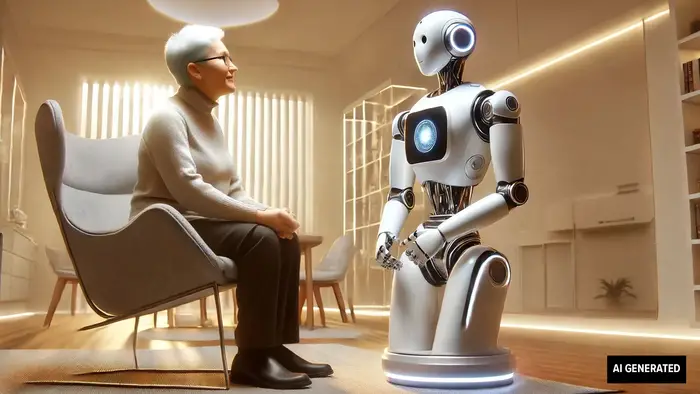Episode 12 | August 29, 2024
AI Care Part 2: Companion Robots Help the Elderly Feel Less Lonely
What if a robot could be a compassionate companion, be an antidote to loneliness as we age, and — in some cases — help those suffering from dementia?
Loneliness among the elderly has become something of an epidemic. According to a recent national survey, about 37% of American adults aged 50 to 80 experienced loneliness, and about 34% of respondents said they felt socially isolated. Companion robots have the potential to alleviate loneliness and improve the well-being of these older adults, as well as help those suffering from memory loss from dementia or Alzheimer’s. They can converse about daily activities, connect to new friends around the country, lead workout sessions, suggest and place calls to loved ones, provide gentle reminders for taking medicines, play music, suggest what's for dinner, and even host live bingo games.
In this episode, which is Part 2 of a two-part episode on robots and health care, we discuss the challenges and opportunities for developing companion robots to help the elderly with loneliness. We also meet ElliQ, an AI-powered companion robot that is already being used in thousands of older adults' homes. The future of companion robots may involve using softbotic technologies to create anthropomorphic features and lifelike physical interaction.
Joining us in part two are four experts in robotics and the elderly: Carmel Majidi, Professor of Mechanical Engineering at Carnegie Mellon University; Selma Šabanović, Professor of Informatics and Cognitive Science and Director of R-House Lab at Indiana University Bloomington; David Crandall, Professor of Computer Sciences and Director of the Luddy Artificial Intelligence Center at Indiana University Bloomington; and Assaf Gad, VP Strategy and GM for Intuition Robotics.
| Never miss an episode! Subscribe to WHERE WHAT IF BECOMES WHAT’S NEXT on Spotify(opens in new window), Apple Podcasts(opens in new window), YouTube Music(opens in new window) or wherever you listen to podcasts. |

